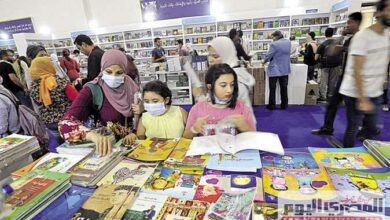In commemoration of Sudanese novelist and columnist Tayeb Salih’s death a year ago, the Supreme Council for Culture held a one-day seminar last Monday on various aspects of his work, as well as his character and influence on Arab and Egyptian culture.
The day brought together familiar faces from the Egyptian literary scene to celebrate Salih’s memory. Writers, critics, journalists, and interested audience members participated in intense discussions and presentations for almost 10 hours.
Salih was born in Karmakol in northern Sudan in 1929. He journeyed across different countries and cultures from Sudan to Britain and later the Gulf, and experimented with different professions such as teaching, writing, and broadcasting. Later he worked in the public sector as the director general at the Ministry of Information of Qatar. Saleh’s works reflect his rich life experiences, and often deal with politically-charged themes such as colonialism and gender.
Despite living most of his life outside Sudan, Salih remained firmly connected to his roots. He is considered one of the most important writers of the contemporary period, and his book Season of Migration to the North, published in 1966, remains one of the most read widely Arabic novels. In 2001, it was selected as the “most important Arabic novel of the 20th century” by the Damascus-based Academy of Arab Letters.
Other Salih novels include The Cypriot Man (1978), The Wedding of Zein (1969) and The Doum Tree of Wad Hamid (1985), in addition to many short stories that are considered some of the best in modern Arabic literature. His novel The Wedding of Zein was turned into a movie that won an award at the Cannes Film Festival in 1976.
Emad Abu Ghazi, head of the Supreme Council for Culture, gave the opening speech last Monday, followed by novelist Khairi Shalabi who reminisced about his memories with Salih and the latter’s engagement with Egyptian literary culture. Salih’s brother, Mahmoud Othman Salih, talked about the Salih family and his brother’s avid readers and supporters. He added that although Tayeb Salih had visited all 22 Arab states, Egypt had a special place in his heart that kept bringing him back to it. A representative from the Sudanese embassy, Ibrahim Adam, emphasized Salih’s cultural importance to Sudan and the Arab world and read some excerpts from Salih’s works.
The next two sessions featured critical discussions about Salih’s works, with much focus on comparing Salih’s writings to his personal life experiences. The panelists also discussed Salih’s representations of Eastern and Western culture, and debated whether or not his literary works can be labelled postcolonial.
In the final session, Shalabi moderated a round-table discussion with some of Egypt’s finest writers, including Bahaa Taher, Youssef Al Qaeed, and Hala el-Badri, who all shared their memories of Salih, but hardly discussed his work. Distinguished Egyptian writer Fawzia Mehran recounted stories about meeting Salih, and always feeling that she was a part of his novels.
“He visited Egypt for at least two months every year, usually in the winter, to make his presence known,” said el-Badri, adding that he followed Egyptian literary works very closely, which empowered Egyptian writers, and deepened their feelings of respect and admiration for Salih.




